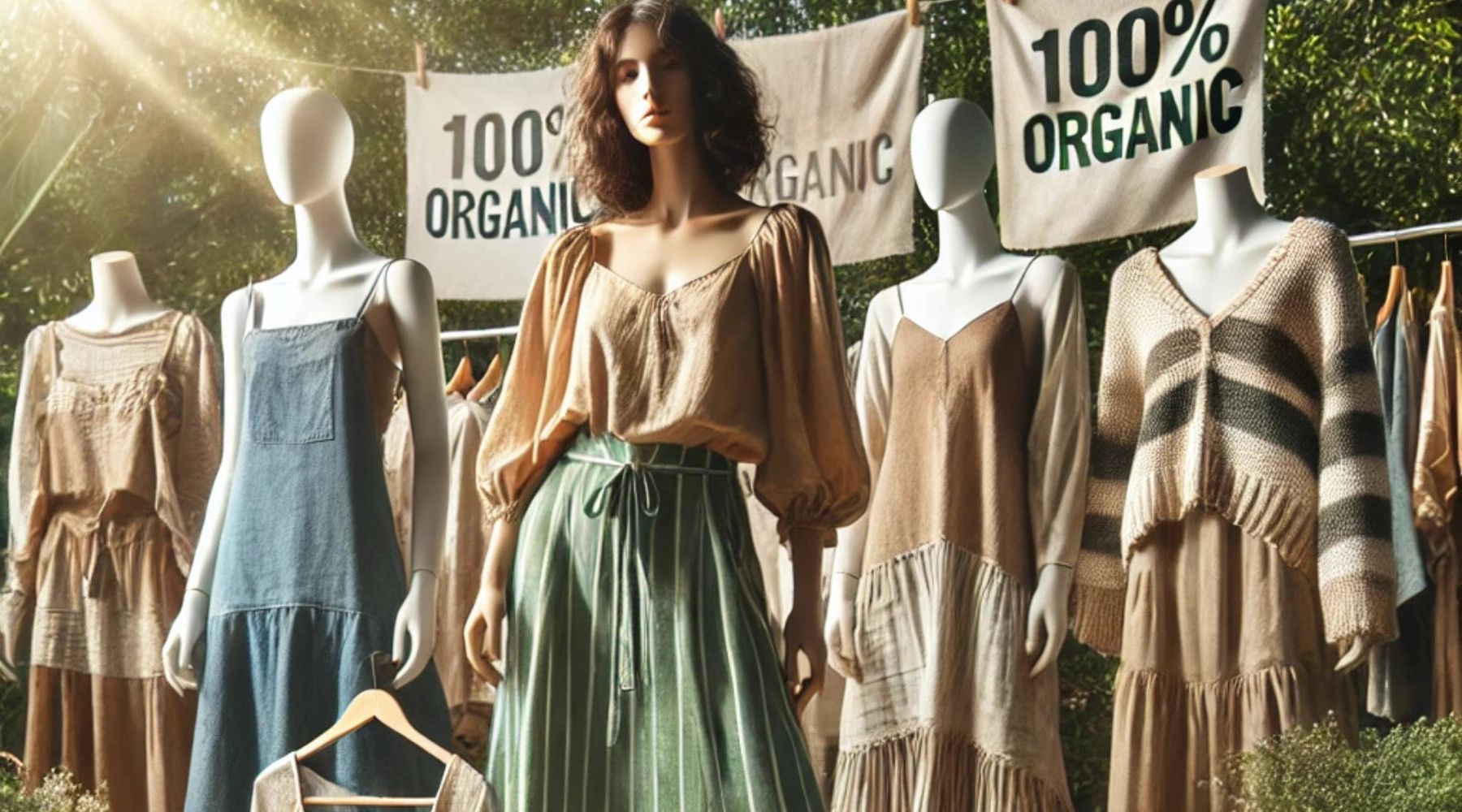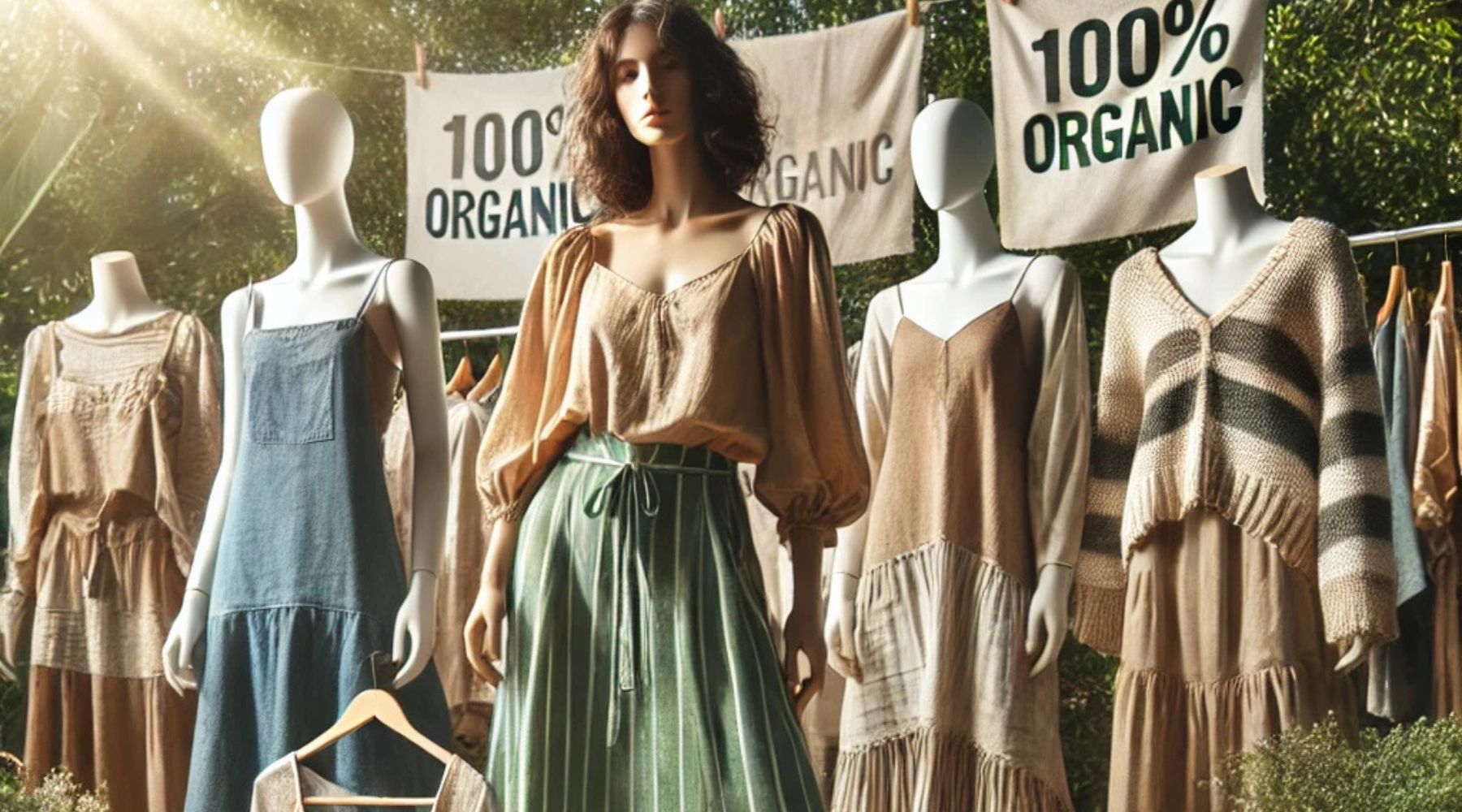The Rise of Organic Women’s Clothing: Why It Matters
In recent years, the fashion industry has seen a growing demand for sustainable and ethical choices. Among these, organic women’s clothing is making significant strides, leading a movement toward more eco-conscious wardrobes. From environmental benefits to personal health advantages, choosing organic women’s clothing is about more than just fashion—it's a step toward a healthier planet and lifestyle. To further elaborate on this point we have taken our time to write about the concepts and ideas around the organic clothing movement for women. We'll explore why this shift matters and how 100% organic cotton women’s clothing plays a pivotal role in this transition.
The Environmental Impact of Organic Women’s Clothing
The environmental benefits of organic women’s clothing are far-reaching, influencing everything from farming practices to global resource conservation. One of the most compelling reasons behind the growing popularity of organic women’s clothing is the significant reduction in environmental damage compared to conventional textile production. Traditional cotton farming is known for being resource-heavy, particularly in terms of water consumption and pesticide use, which has severe consequences for both the planet and the communities that depend on agriculture.
In contrast, organic cotton is grown using eco-friendly methods that prioritize sustainability. For example, organic cotton farms often employ crop rotation techniques to maintain soil health, which can help prevent the soil degradation common in non-organic farming. By avoiding harmful synthetic chemicals, organic farming not only keeps the soil fertile for future crops but also reduces chemical runoff into water sources, which protects local ecosystems and wildlife.
One of the most impactful aspects of organic cotton is its significantly lower water consumption. A comprehensive study revealed that organic cotton farming reduces water use by up to 91%, a major factor considering that the textile industry is one of the most water-intensive sectors in the world. This reduction is largely due to the fact that organic cotton is primarily rain-fed, whereas conventional cotton often relies on large-scale irrigation systems that deplete local water reserves. The less water used in cotton production, the less strain there is on communities already facing water scarcity.
Beyond water conservation, the absence of toxic pesticides and fertilizers in organic cotton farming leads to a healthier environment overall. Conventional cotton is notorious for being one of the most pesticide-dependent crops, contributing to soil contamination and a loss of biodiversity. These chemicals not only harm the land but also the people who live and work in agricultural areas, where exposure to these toxins can lead to health issues over time.
By choosing organic women’s clothing, you are contributing to a larger movement that values the planet’s health. Your choices as a consumer support farming practices that maintain soil fertility, conserve water, and protect biodiversity, ensuring that fashion is as sustainable as it is stylish.
Source: Environmental Benefits of Organic Cotton Farming
These collective benefits underscore the importance of organic cotton in helping to reverse the damaging environmental effects of traditional cotton farming. As consumers continue to demand more sustainable choices, organic women’s clothing provides a practical and impactful way to reduce your ecological footprint, all while enjoying high-quality, comfortable garments.
Health Benefits of Wearing 100% Organic Cotton Women’s Clothing
Beyond its environmental advantages, wearing 100% organic cotton women’s clothing offers a variety of health benefits that many consumers may not be aware of. Unlike conventional cotton, which is often grown and processed using chemical fertilizers, pesticides, and synthetic dyes, organic cotton is cultivated and manufactured without harmful toxins. This distinction makes a significant difference for those with sensitive skin, allergies, or conditions like eczema, as exposure to chemical residues in non-organic fabrics can lead to irritation and long-term health issues.
One of the primary health benefits of organic cotton is its hypoallergenic properties. Organic cotton is naturally softer and gentler on the skin because it isn’t treated with harsh chemicals during the production process. This makes it an excellent choice for individuals with skin sensitivities, as the absence of irritants reduces the likelihood of allergic reactions. For example, conventional cotton fibers can retain traces of pesticides and formaldehyde, which are known to cause skin discomfort, especially in people with pre-existing conditions.
In fact, research indicates that switching to organic fabrics can improve skin health for those with conditions like eczema. A peer-reviewed study demonstrated that individuals who suffer from eczema or other skin irritations experienced fewer flare-ups and discomfort when they transitioned to wearing organic cotton. The study found that the absence of chemicals and synthetic dyes in organic fabrics contributed to improved skin health and comfort.
Source: The Impact of Organic Fabrics on Skin Conditions
Additionally, organic cotton is highly breathable, allowing for better air circulation, which helps keep the body cool in hot weather and warm in cooler climates. This natural breathability can enhance comfort throughout the day, as synthetic fabrics and chemically treated fibers often trap moisture, leading to discomfort and even skin infections in some cases. Organic cotton’s ability to wick away moisture without irritating the skin makes it a smart, healthy choice for daily wear.
Another often overlooked benefit of 100% organic cotton women’s clothing is its durability. Because organic cotton is grown without the use of synthetic fertilizers, the fibers tend to be stronger and longer-lasting. This means that not only is the fabric softer on the skin, but it also stands up to repeated washing and wearing without breaking down or shedding microplastics, which can be harmful when ingested or inhaled. In the long run, investing in organic cotton can save you money by reducing the need for frequent clothing replacements.
By making the switch to organic cotton, you’re not just choosing sustainable clothing—you’re prioritizing your health. Whether you’re concerned about allergies, skin irritations, or just want to avoid the harmful chemicals present in conventional clothing, organic women’s clothing offers a safe, comfortable, and eco-friendly alternative.
Organic Women’s Clothing: A Path to a Sustainable Wardrobe
In recent years, the rise of organic women’s clothing has become an integral part of the sustainable fashion movement, offering a more eco-conscious alternative to fast fashion. As consumers become more aware of the environmental and social impact of their clothing choices, organic cotton has emerged as a preferred fabric for building a sustainable wardrobe. But what exactly makes organic women’s clothing such a crucial element in the push toward sustainability?
First, organic clothing aligns with the principles of slow fashion, a movement that encourages consumers to invest in high-quality, long-lasting garments rather than cheap, disposable items. By choosing 100% organic cotton women’s clothing, you're not only opting for a fabric that’s gentler on the planet, but you're also supporting brands that prioritize ethical manufacturing processes. This means less waste, fewer harmful chemicals, and better working conditions for garment workers.
One of the core advantages of organic cotton is that it’s biodegradable, which is essential in an industry notorious for its contribution to landfills. Conventional synthetic fabrics like polyester can take hundreds of years to decompose, releasing harmful microplastics into the environment in the process. On the other hand, organic cotton breaks down naturally and does not contribute to the ongoing problem of plastic pollution. This is especially important given the growing awareness around the harmful effects of microplastics on marine ecosystems and human health.
The push for sustainability also extends beyond just the materials used in clothing production. Many brands that produce organic women’s clothing are committed to ethical labor practices and fair trade certifications, ensuring that the people who make the clothes are paid fair wages and work in safe conditions. This transparency and focus on social responsibility is a key component of creating a sustainable wardrobe. As consumers, choosing clothing that is produced under ethical conditions helps to reduce the exploitation commonly seen in fast fashion supply chains.
Recent studies show that sustainable fashion practices are on the rise, with more consumers prioritizing eco-friendly materials and ethical manufacturing. According to a peer-reviewed report, the demand for organic and sustainable fashion materials is expected to grow significantly as awareness of the environmental and social costs of fast fashion continues to spread. The report highlights that the shift toward organic cotton clothing is part of a larger trend where consumers are increasingly valuing transparency and accountability in the fashion industry.
Source: The Growth of Sustainable Fashion
Investing in organic women’s clothing also promotes a mindset of mindful consumption. Rather than following trends that come and go with each season, sustainable fashion encourages you to purchase timeless pieces that will last for years. This approach not only reduces waste but also supports the idea of a "circular economy," where clothing is reused, recycled, or upcycled, minimizing the environmental impact of fashion production.
By building your wardrobe with organic women’s clothing, you're making a statement that fashion can be both stylish and responsible. It’s a move toward reducing your carbon footprint, supporting fair labor practices, and contributing to a more sustainable future for the fashion industry. Every choice counts, and by opting for organic cotton, you’re helping to lead the way toward a more eco-friendly world.
The rise of organic women’s clothing marks an important shift in the fashion world—one that is driven by the need for sustainability, health, and ethical practices. By choosing 100% organic cotton women’s clothing, you’re not only making a positive impact on the environment but also safeguarding your health and supporting fair, responsible production processes. As more people embrace these choices, the future of fashion looks bright, sustainable, and inclusive for everyone.
 Rewards
Rewards























